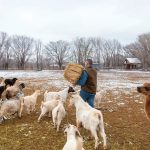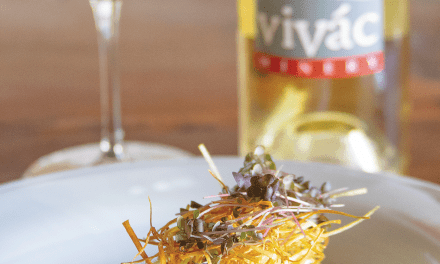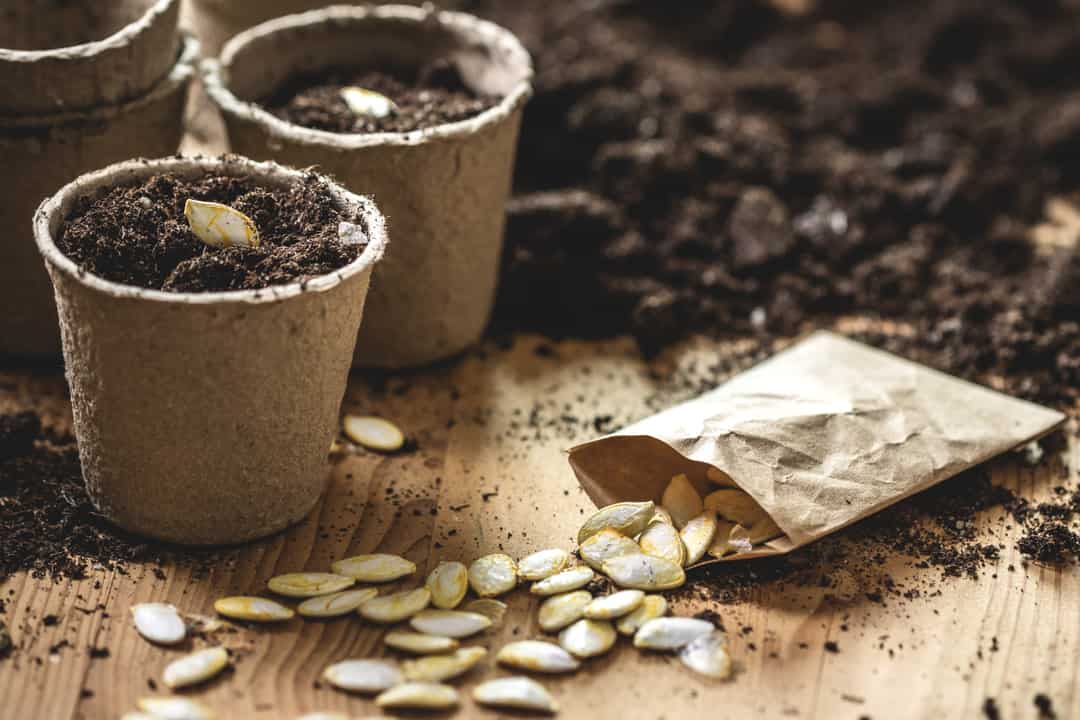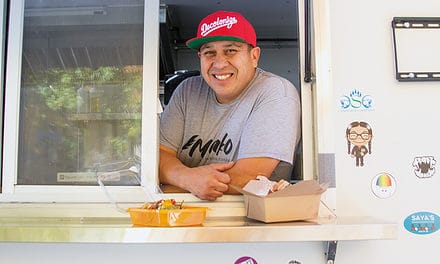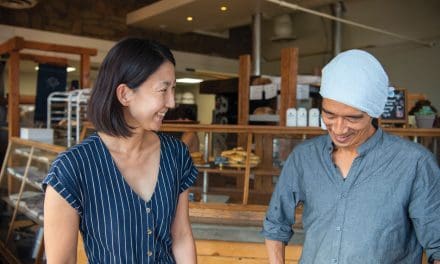Feeding All Relations with Plant Relatives
Words and Photos by Ungelbah Dávila-Shivers

Tina Archuleta prepping prickly pear tunas.
Plant food is Indigenous food. Squash, beans, corn, amaranth—these are the foods that have sustained Pueblo and other Indigi-nations across Turtle Island for hundreds of thousands of years. Tina Archuleta, a citizen of Jemez Pueblo and owner/creator of Itality Plant Based Foods, is bringing culturally relevant meals like plant-based enchiladas, stews, and empanadas to the grab-and-go menu at her newly opened restaurant at Avanyu Plaza in Albuquerque, across from the Indian Pueblo Cultural Center.
A finalist at the 2020 Food Funded Entrepreneurship and Investor Fair, Archuleta says, “Plant foods are Native foods. Plants are our oldest ally. Plants are our relatives and they’re here for us. My food is not going to hurt anyone. I use barely any sugar in my recipes. I don’t use bleached flour. I don’t use lard. I don’t use cheese, which is very high in saturated fat. I am thinking of the Native people in our community (with illnesses like diabetes). And this food is not hurting them. It’s medicine.”
More than fifteen years ago, Archuleta was inspired by Rastafari lifeways to transition into a plant-based diet. She began farming produce at her home in Jemez Pueblo and selling it at the community farmers market. During this time, folks began asking her how to cook with the produce she was selling, such as kale, and she saw a need in her community for education around the reintroduction of plant foods into people’s diets. She began giving cooking demonstrations and from there her path toward using food as medicine and farming for sovereignty took off. But her real story begins at her grandmother’s kitchen table, in her great-grandmother’s garden in Santo Domingo Pueblo, and along the fertile riverbanks of her home.
“When you’re driving through Jemez, you can see all the colors of the rainbow,” she says. “I would say that’s when my journey began. You start as a youth in Pueblo communities helping in the field with food. So that’s what my earliest memories are, of me processing food, and out in the field with my family.”

Locally gathered tunas for prickly pear fruit compote.
Growing up on the Pueblo, she recounts, most of her childhood was spent outdoors during a time when the digital world was a science fiction dream. Playing by the river and in the mountains instilled in her a deep connection to her homeplace and the plant life there that has been the ally of her people for generations. She remembers her grandmothers using plant medicine to nurse her and her relatives when they were sick, and the massive gardens her grandma Bertha Bird and great-grandma Helen Fragua grew. These gardens provided the seemingly endless amounts of tomatoes, peaches, and other nutritious foods, always available to her when she visited.
“When we were sick, my grandma Berniece Archuleta would steam us with rosemary and we would drink peppermint tea,” she remembers. “My grandma always had a garden, so I was always out there with her and she was always processing food, because she had so much. She would just have a basket on the table of tomatoes or whatever harvest she had.” Those harvests included cultivated fruits, like raspberries and peaches, as well as wild-growing cota and prickly pear.
Today there is much conversation about the food movement and terms like food sovereignty and food justice. For Archuleta, those terms are new expressions of practices that have always been a part of her world, either working for or against her and Indigenous peoples’ ways of life. “There’s a lot of cliché words around the whole movement, and it’s hard for me to fall into that language,” she explains. “But for me, food sovereignty is the controlling of our own food as a sovereign nation, as well as the self-sovereignty of controlling the food we intake as a people, individually.”
Over time, self-reliance of this nature has dwindled for reasons ranging from the demonization of certain foods, such as amaranth or other Native plants that are highly nutritious but identified as “weeds” in Western culture, to the influence of government commodity foods to dependence on grocery stores that aren’t easily accessible—resulting in more processed foods in the diet. She recalls a Taos elder woman at an intertribal food sovereignty summit telling her that as a child she was disappointed at her parents because she believed the foods identified on the American food pyramid were the most healthy and that the traditional foods in the elder’s childhood home at Taos Pueblo were not. The foods represented on the pyramid at that time were influenced by European diets foreign to Pueblo people and others.

Prickly pear fruit (whose dark, round seeds are edible) is one of many Native foods that has been underappreciated in Western culture.
“My grandpa has stories of when he was a child, they would build trenches for their pumpkins and bury their pumpkins, to keep them cold for later use. They don’t do that anymore,” says Archuleta. “Food sovereignty, to me, is one’s own community, one’s own self, controlling the food that they intake and just being aware of how it got to our plates.”
She gives the example of Jemez Pueblo farmers who take excess produce to the Head Start center for the children to eat, or the Native American Community Academy, which gives excess food from their garden to the students’ families.
“That’s what Itality is trying to do. We’re trying to get food from Native farmers here to Itality, where I process it and return it to Native people,” she says. “It’s going through this cycle of sovereignty, where we’re controlling our own food. It can even go further to the point where we’re not participating in a food system that is oppressive and abusive.”
The Itality menu is vegan, relying only on plant-based recipes that Archuleta herself has developed to create traditional Pueblo foods like red chile and burritos, as well as desserts like her seasonal prickly pear cheesecake, which uses locally gathered prickly pear fruit compote, processed in-house by Archuleta.
“We can remove ourselves from that oppressive food system by not supporting the commercial dairy industry, not supporting the commercial meat industry, not supporting fast food, and just kind of sticking to our Native foods. That’s another level of food sovereignty,” says Archuleta. “And that’s the level I like to be on myself. I don’t eat fast food. I don’t support the fast food industry. I don’t support the meat and dairy industry. And that all falls back to Earth ethics for me, and how am I, as an individual, impacting the Earth. Those industries are not helpful to where we’re trying to go in the healing of the Earth.”
For Archuleta, and those she feeds, this lifeway of reclaiming control of our diet is a form of justice and healing, which she hopes to share through the food she creates for the public at Itality. Her hope is that her patrons and employees will take what they learn and experience at Itality back into their own kitchens and communities.
“We’re in control of the outcome of what we’re putting in our bodies,” she says. “The health outcomes, the mental outcomes, the spiritual outcomes, and the Earth outcomes. We’re just taking responsibility and reaping that justice for what we’ve been through with an unjust food history. . . . It’s that reclamation of foodways.”
2500 Twelfth Street, Albuquerque, italitynm.com

Ungelbah Dávila
Ungelbah Dávila lives in Valencia County with her daughter, animals, and flowers. She is a writer, photographer, and digital Indigenous storyteller.



